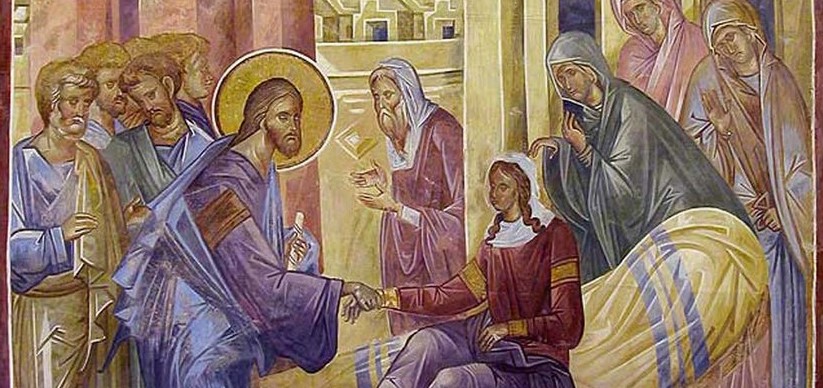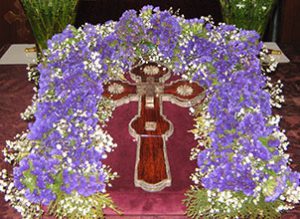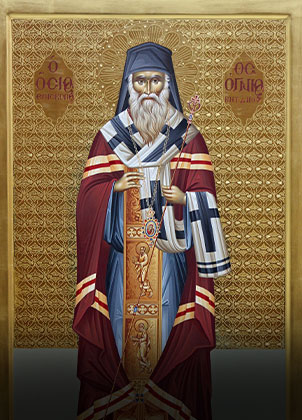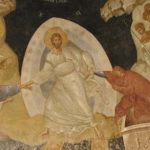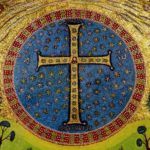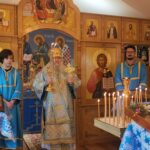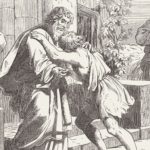Во имя Отца и Сына и Св. Духа.
Сегодняшнее чтение из послания св. Ап. Павла к Коринфянам говорит о всеобщем воскресении.
«Ибо знаем, что, когда земной наш дом, эта хижина, разрушится, мы имеем от Бога жилище на небесах, дом нерукотворенный, вечный. Оттого мы и воздыхаем, желая облечься в небесное наше жилище; только бы нам и одетым не оказаться нагими. Ибо мы, находясь в этой хижине, воздыхаем под бременем, потому что не хотим совлечься, но облечься, чтобы смертное поглощено было жизнью. На сие самое и создал нас Бог и дал нам залог Духа» (2 Кор. 5).
“когда земной наш дом, эта хижина, разрушится, мы имеем от Бога жилище на небесах, дом нерукотворенный, вечный”.
Апостол говорит здесь о нашем теле, называя его «нашим земным домом». Наша душа живет в теле как в своем земном жилище. Когда же эта временная хижина разрушится болезнями, старостью и, наконец, смертью, то мы получим от Бога жилище вечное, неразрушаемое на небесах.
Заметьте, что Апостол не говорит, что земная хижина уничтожится, а «разрушится». Потому что наше тело не уничтожится, а только разложится на элементы, чтобы в последний день воскреснуть уже нетленным: «смертное поглощено будет жизнью».
Затем Апостол добавляет: «мы воздыхаем, желая облечься в небесное наше жилище; только бы нам и одетым не оказаться нагими.».
Что это значит? Как может кто-либо, будучи одетым, оказаться нагим?
В последний день все люди воскреснут, все восстанут в нетленном теле. Но одни будут облечены в прекрасную одежду славы, а другие будут лишены этой славы. Они будут испытывать невыразимый стыд, как стоящие нагими перед множеством людей. Такой стыд испытали Адам и Ева, когда они нарушили данную им заповедь Божию. До их грехопадения Св. Дух покрывал их одеждой славы и благодати. Но за их отступничество они лишились этой одежды и увидели себя нагими.
Апостол говорит далее: «На сие самое и создал нас Бог и дал нам залог Духа». Мы получили залог Св. Духа в таинствах крещения и миропомазания. Но необходимо каждому из нас трудиться, чтобы преумножить этот залог.
Св. Макарий Великий учит: «Каждый должен стараться преуспеянием во всех добродетелях приобрести … общение и единение со Святым Духом … и ту нетленную славу, которая в день воскресения созиждет и прославит и жилище тела.»
В житии св. Маркиана пресвитера, описывается такое событие: Св. Маркиан участвовал в освящении храма, им построенного. В то время как он шел в процессии по улицам города, к нему подошел нищий и просил милостыни. У св. Маркиана не было с собой денег, но он не хотел отпустить нищего ни с чем. Он отошел незаметно в тайное место, снял с себя одежду и отдал нищему, а сам остался в одной священнической фелони, поверх нагого тела. Фелонь опускалась до земли, и потому нельзя было видеть, что он был без одежды. Однако, когда настало время причащения, и св. Маркиан протянул руки принять Тело Христово, то многие клирики увидели, что под фелонью он был одет в драгоценную блистающую одежду. После окончания службы клирики пожаловались Патриарху, что Маркиан, вопреки церковным канонам, носит дорогие одежды, скорее приличные царю, а не служителю Церкви. Когда Патриарх приказал ему поднять фелонь, то все увидели, что он был наг.
Таким чудесным видением Бог показал, что добрые дела по заповедям Христовым, украшают душу светлой одеждой, сотканной из благодати Св. Духа.
В крещении мы облеклись в «одежду нетления». «Елицы во Христа крестистеся во Христа облекостеся» (Гал. 3:27). Христос – наша одежда и Он – наше жилище. Он говорит о тех, кто причащается Св. Таин: «Ядущий Мою Плоть и пиющий Мою Кровь пребывает во Мне, и Я в нем» (Иоан. 6,56). Мы пребываем в Нем, и Он пребывает в нас.
Наше тело – освященный храм Божий. Потому больше всего нужно хранить эту святость. В особенности это относится к молодым людям. Не подражайте безобразным обычаям мира, удаляйтесь от всякой нечистоты греха, храните святость своего тела от плотских падений. Много нужно будет пролить слез, чтобы отмыть эту нечистоту. Не теряйте бездумно сокровище чистоты и святости.
Аминь
In the name of the Father, and of the Son and of the Holy Spirit.
Today’s reading from Apostle Paul’s Epistle to the Corinthians, speaks of the Universal Resurrection.
“For we know that if our earthly house, this tent, is destroyed, we have a building from God, a house not made with hands, eternal in the heavens. For in this we groan, earnestly desiring to be clothed with our habitation which is from heaven, if indeed, having been clothed, we shall not be found naked. For we who are in this tent groan, being burdened, not because we want to be unclothed, but further clothed, that mortality may be swallowed up by life. Now He who has prepared us for this very thing is God, who also has given us the Spirit as a pledge.” (2 Cor. 5).
“If our earthly house, this tent, is destroyed, we have a building from God, a house not made with hands, eternal in the heavens.”
Here, the Apostle speaks about our body, calling it “our earthly house.” Our soul inhabits the body as its own earthly dwelling. While with time this temporary abode is destroyed by sickness, old age and finally death, we have received an eternal dwelling in the heavens from God, which is indestructible.
You will note that the Apostle doesn’t say that the earthly house will be obliterated, but “destroyed.” This is because our body will not be obliterated, but will only decay into various elements so that it may resurrect incorruptible on the final day: “that mortality may be swallowed up by life.”
The Apostle further adds: “We groan, earnestly desiring to be clothed with our habitation which is from heaven, if indeed, having been clothed, we shall not be found naked”.
What does this mean? How can one being clothed become naked?
On the Last Day, all humans will resurrect in their incorruptible bodies. However, some will be clothed in magnificent attire of glory, while others will be denied this glory. Standing naked before a multitude of people, they will be experiencing inexpressible shame – just like Adam and Eve, when they violated God’s commandment. Before they fell through sin, the Holy Spirit clothed them with vestments of glory and grace. But because of their disloyalty they lost their attire and saw themselves naked.
The Apostle says further: “Now He who has prepared us for this very thing is God, Who also has given us the Spirit as a pledge.” We received the pledge of Holy Spirit through Baptism and Chrismation. But it’s essential that each one of us strive to increase this pledge.
Saint Makarios the Great teaches us: “Everybody should endeavour to acquire communion and unity with the Holy Spirit through success in all good works … and that incorruptible glory that will establish and glorify the bodily dwelling.”
In the life of the holy Presbyter Marcian, the following event took place: Saint Marcian participated in the consecration of a church that he had built. During the procession through the streets of the city, a beggar approached him asking for alms. Unfortunately, while the Saint didn’t have any money on him, he didn’t want to send him away without anything. He quietly slipped away into private area, took off his clothing, and gave it to the beggar, leaving his own naked body clothed just in the phelonion (priestly vestment).
As the phelonion came down to the ground, it was impossible to see that he was undressed. However, when the time came to receive Holy Communion and the Saint stretched out his hands to receive Christ’s Body, many of the present clergy noticed that under his phelonion, he was dressed in very expensive and shining clothing. Upon the conclusion of the church service, the clerics complained to the Patriarch that contrary to the Church Canons, Marcian was wearing costly clothing, which were more fitting to royalty than a servant of the Church. When the Patriarch ordered him to lift his phelonion, everybody saw that he was naked underneath. By this miraculous vision, God demonstrated that good works according to Christ’s commandments adorn the soul with bright attire, woven from the grace of the Holy Spirit.
In baptism, we are arrayed in “the robe of incorruption.” “For as many of you as were baptised into Christ have put on Christ.” (Gal. 5:27). Christ is our attire, and He is our dwelling. He speaks of those that partake of Holy Communion: “He who eats My flesh and drinks My blood abides in Me, and I in him,” (John 6:56). We abide in Him, and He abides in us.
Our body is God’s holy temple, and that’s why above all else, we should cherish this sanctity. This is especially applicable to the young people. Do not emulate the world’s foul habits; distance yourself from all pollutions of sin; treasure and preserve the holiness of your body from all carnal failings. Many tears have to be shed in order to cleanse you of this defilement. Do not mindlessly lose the treasures of purity and holiness.
Amen

